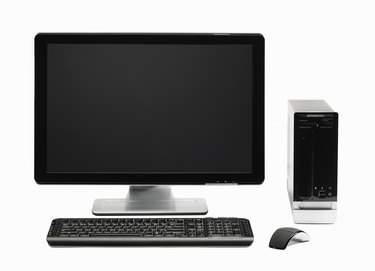
Computer memory constitutes an essential component of almost all computing systems. Computer memory storage systems hold the data that the computer uses, and that data includes movies, music, pictures, documents and any other data. When people talk about computer memory, they are usually talking about either Random-Access Memory or RAM, which is like the short-term memory of your computer or the hard disk drive, or hard drive–which is your computer's main memory center. Computer memory also appears very often in the form of various sized flash memory devices, and computer memory is also stored on different sized CD-ROMs, rewritable CDs, DVDs and Blu-Ray memory.
RAM
Video of the Day
Random-Access Memory comes in the form of sticks of memory that are about as big as a pack of chewing gum. They plug into the motherboard of a desktop computer, or laptop and provide short-term memory storage for the system. Most desktops and laptops ship with a certain amount of RAM, then consumers upgrade it with more. RAM currently comes in such sizes as 512 megabyte (MB), 1 gigabyte (GB) and 2 gigabytes. One gigabyte of RAM can cost as little as $35, and you can still get 512 megabytes of RAM for $20. The 2 GB sticks can cost $100 or more. Desktop computers come with a limited amount of slots for new RAM, usually two or three, as well as a maximum size RAM limit. Notebook RAM is smaller than desktop RAM and costs slightly more. You can get 1GB of notebook RAM for about $40.
Video of the Day
Hard Disk
The hard disk drive lives inside your desktop computer or laptop and stores all the memory of the computer on one big, sealed drive. Hard disk computer memory sizes are currently as high as 2 terabytes (TB), which is 2,000 gigabytes, or 2,000,000 megabytes. This is so much space, you can put entire film, audio and document libraries on one drive. They sell for as little as $200. There are also 1.5 TB drives, 1 TB drive, 500 GB drives, 300 GB drives, 128 GB drives with prices getting progressively lower as you move down in storage size.
Flash
Flash memory often comes in easy to carry flash drives, which are as small as a stick of gum. They comes in common sizes like 2 GB, 4 GB, 8 GB, and 16 GB starting at about $20 and going to $65 for the 16 GB variety. The popular iPod Shuffle is a 2 GB flash drive the size of a stick of gum that costs about $60.
CD-ROM, DVD and Blu-Ray
Computer memory is also stored on CD-ROM, DVD and Blu-Ray discs read by the appropriate drive. A CD-ROM can hold up to 900 megabytes, a DVD up to 17 gigabytes, and a Blu-Ray can hold up to 50 gigabytes of data, which is quite a lot.